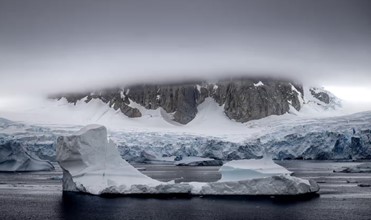
Antarctic Temperatures Soar 10C Above Average in Near Record Heatwave
Reported temperatures on the continent during midwinter reached 28C above expectations on some days in July. Ground temperatures across vast areas of Antarctica's ice sheets have risen an average of 10C above normal over the past month, described as a near-record heatwave.
Despite remaining below zero on the polar landmass, which is in perpetual darkness during this time of year, temperatures have reportedly reached 28C above expectations on some days. The globe has experienced a year of record warmth, with temperatures consistently surpassing the 1.5C rise above preindustrial levels, which is considered the threshold to avoid the worst impacts of climate breakdown.
Michael Dukes, the director of forecasting at MetDesk, stated that while individual daily high temperatures are surprising, the average rise over the month is far more significant. Climate scientists have long predicted that the most significant effects of human-induced climate change would be seen in polar regions, "and this is a great example of that," he said.
"Usually, you can't just look at one month for a climate trend, but it aligns with what models predict," Dukes added. "In Antarctica, such warming in winter and continuing into summer can lead to the collapse of ice sheets."
Last month was the first in 14 months that temperature records were not broken, following an exceptionally warm July 2023, which remained 0.3C above any previous July. Zeke Hausfather, a research scientist at Berkeley Earth, noted that Antarctica's heatwave has "definitely been one of the bigger drivers in the spike of global temperatures in recent weeks."
"Antarctica has warmed along with the rest of the world over the past 50 and 150 years, so any heatwave starts from that elevated baseline," he said. "But it's safe to say that the majority of the recent spike was driven by the heatwave."
This heatwave is the second to hit the region in the past two years, with the previous one in March 2022 causing a spike of 39C and leading to the collapse of an ice sheet the size of Rome. The increased July temperatures in Antarctica follow a particularly strong El Niño, a climate phenomenon that leads to global warming, and was likely a lag effect of that combined with the general increase in temperatures caused by climate breakdown, Dukes said.
Scientists identified the weakened polar vortex, a band of cold air and low pressure that spins in the stratosphere around each pole, as the proximate cause of the heatwave. Interference from atmospheric waves weakened the vortex and led to rising high-altitude temperatures this year, Amy Butler, an atmospheric scientist at the National Oceanic and Atmospheric Administration, told the Washington Post.
Jamin Greenbaum, a geophysicist at the University of California San Diego's Scripps Institution of Oceanography, expressed concern about the region's future. "The majority of my field expeditions have been to East Antarctica, where I have seen increasing melt over the years," he said. "Although I'm alarmed by reports of the weakened polar vortex causing the tremendous heatwave, I'm not surprised, considering this is an expected outcome of climate change."
Jonathan Overpeck, a climate scientist at the University of Michigan School for Environment and Sustainability, said on X that the heatwave is an "eye-opening sign that climate change is starting to transform the planet." Edward Blanchard, an atmospheric scientist at the University of Washington, told the Post it was a near-record event. "It is likely that having less sea ice and a warmer Southern Ocean around the Antarctic continent 'loads the dice' for warmer winter weather over Antarctica," Blanchard said.
"From this perspective, it might be a bit 'less surprising' to see large heatwaves in Antarctica this year compared to a 'normal' year with average sea ice conditions," he added. Jonathan Wille, a researcher studying climate science at ETH Zürich, noted that the heatwave was due to a weeks-long "southern stratospheric warming event" over the region. "These events are rare over Antarctica, so it wasn't clear how they would affect surface conditions on the continent," he said. "It's been interesting to see how widespread the effects have been."
While he observed that "more frequent heatwaves seem to be occurring over the continent," he said it is not yet clear how much the climate crisis contributed to this particular event. "We'll have to wait for the attribution studies to find out," he said. "It's a 'wait and see' scenario."